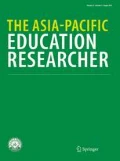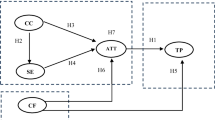Abstract
This study, first of all, aimed to develop a new survey to assess Taiwanese teachers’ perceived self-efficacy in STEM knowledge. Second, it aimed to probe any differences in teachers’ perceived self-efficacy in STEM knowledge regarding their gender and teaching subjects. Last, we examined the structural relations among teachers’ perceived self-efficacy in STEM knowledge and their attitudes toward STEM education. The participants were 220 high school teachers in Taiwan. The 30-item instrument consisted of six factors: scientific inquiry, technology use, engineering design, mathematical thinking, and synthesized knowledge of STEM, as well as attitudes toward STEM education. The results showed that the proposed instrument was valid and reliable. In addition, male teachers outperformed female teachers in each dimension of the survey. Last, teachers’ self-efficacy in synthesized knowledge of STEM had two mediating effects. One was in the relationship between self-efficacy in engineering design and attitudes toward STEM education. The other was in the relationship between self-efficacy in Mathematical Thinking and Attitudes toward STEM education.



Similar content being viewed by others
References
Bagozzi, R. P., & Yi, Y. (1988). On the evaluation of structural equation models. Academic of Marketing Science, 16(1), 76–94.
Bandura, A., Barbaranelli, C., Caprara, G. V., & Pastorelli, C. (1996). Multifaceted impact of self-efficacy beliefs on academic functioning. Child Development, 67(3), 1206–1222. https://doi.org/10.1111/j.1467-8624.1996.tb01791.x.
Bong, M. (1999). Personal factors affecting the generality of academic self-efficacy judgments: Gender, ethnicity, and relative expertise? The Journal of Experimental Education, 67(4), 315–331. https://doi.org/10.1037/e527772014-429.
Bottia, M. C., Stearns, E., Mickelson, R. A., Moller, S., & Valentino, L. (2015). Growing the roots of STEM majors: Female math and science high school faculty and the participation of students in STEM. Economics of Education Review, 45, 14–27. https://doi.org/10.1016/j.econedurev.2015.01.002.
Chai, C. S., Koh, J. H. L., & Teo, Y. H. (2018). Enhancing and modeling teachers’ design beliefs and efficacy of technological pedagogical content knowledge for 21st century quality learning. Journal of Educational Computing Research. https://doi.org/10.1177/0735633117752453.
Chai, C. S., Koh, J. H. L., & Tsai, C.-C. (2013). Facilitating preservice teachers’ development of Technological, Pedagogical, and Content Knowledge (TPACK). Educational Technology & Society, 13, 63–73.
D’Angelo, C., Rutstein, D., Harris, C., Bernard, R., Borokhovski, E., & Haertel, G. (2014). Simulations for STEM learning: Systematic review and meta-analysis. Menlo Park: SRI International.
DeCoito, I., & Myszkal, P. (2018). Connecting science instruction and teachers’ self-efficacy and beliefs in STEM education. Journal of Science Teacher Education. https://doi.org/10.1080/1046560X.2018.1473748.
Donna, J. D. (2012). A model for professional development to promote engineering design as an integrative pedagogy within STEM education. Journal of Pre-College Engineering Education Research. https://doi.org/10.5703/1288284314866.
Driskell, N. (2014). Global perspectives: Explaining Taiwan’s dramatic improvement in PISA reading. Washington, DC: NCEE (National Center on Education and The Economy). Retrieved from http://ncee.org/2014/10/global-perspectives-explaining-taiwans-dramatic-improvement-in-pisa-reading/.
English, L. D. (2016). STEM education K-12: Perspectives on integration. International Journal of STEM Education, 3(1), 3. https://doi.org/10.1186/s40594-016-0036-1.
English, L. D., & King, D. T. (2015). STEM learning through engineering design: Fourth-grade students’ investigations in aerospace. International Journal of STEM Education, 2(1), 14. https://doi.org/10.1186/s40594-015-0027-7.
Fornell, C., & Larcker, D. F. (1981). Evaluating structural equation models with unobservable variables and measurement error. Journal of Marketing Research, 18(1), 39–50.
Griffith, A. L. (2014). Faculty gender in the college classroom: Does it matter for achievement and major choice? Southern Economic Journal, 81(1), 211–231. https://doi.org/10.4284/0038-4038-2012.100.
Guzey, S. S., Moore, T. J., & Harwell, M. (2016). Building up STEM: An analysis of teacher-developed engineering design-based STEM integration curricular materials. Journal of Pre-College Engineering Education Research. https://doi.org/10.7771/2157-9288.1129.
Hair, J. F., Black, W. C., Babin, B. J., Anderson, R. E., & Tatham, R. L. (2006). Multivariate data analysis (6th ed.). New York: Prentice Hall.
Honey, M., Pearson, G., & Schweingruber, H. (Eds.). (2014). STEM integration in K–12 education: Status, prospects, and an agenda for research. Washington, DC: National Academies Press.
Joreskog, K. G., & Sorbom, D. (1986). LISREL VI: Analysis of linear structural relationships by maximum likelihood, instrumental variables, and least squares methods (4th ed.). Mooresville, IN: Scientific Software.
Kelley, T. R., & Knowles, J. G. (2016). A conceptual framework for integrated STEM education. International Journal of STEM Education, 3(1), 11. https://doi.org/10.1186/s40594-016-0046-z.
Lee, M.-H., & Tsai, C.-C. (2010). Exploring teachers’ perceived self-efficacy and technological pedagogical content knowledge with respect to educational use of the World Wide Web. Instructional Science, 38, 1–21.
Leel, H.-C. (2011). In defense of concordancing: An application of data-driven learning in Taiwan. Procedia - Social and Behavioral Sciences, 12, 399–408. https://doi.org/10.1016/j.sbspro.2011.02.049.
Lin, T.-C., Tsai, C.-C., Chai, C. S., & Lee, M.-H. (2013). Identifying science teachers’ perceptions of technological, pedagogical, and content knowledge (TPACK). Journal of Science Education and Technology, 22, 325–336.
Lin, K.-Y., & Williams, P. J. (2016). Taiwanese preservice teachers’ science, technology, engineering, and mathematics teaching intention. International Journal of Science and Mathematics Education, 14(6), 1021–1036. https://doi.org/10.1007/s10763-015-9645-2.
Ministry of Education. (2018). Grade 1-12 curriculum guidelines. Retrieved from https://www.edu.tw/News_Content.aspx?n=D33B55D537402BAA&s=37E2FF8B7ACFC28B.
Mishra, P., & Koehler, M. J. (2006). Technological pedagogical content knowledge: A framework for teacher knowledge. Teachers College Record, 108, 1017–1054.
Nadelson, L. S., Callahan, J., Pyke, P., Hay, A., Dance, M., & Pfiester, J. (2013). Teacher STEM perception and preparation: Inquiry-based STEM professional development for elementary teachers. The Journal of Educational Research, 106(2), 157–168. https://doi.org/10.1080/00220671.2012.667014.
National Academy of Engineering and National Research Council. (2014). STEM integration in K–12 education: Status, prospects, and an agenda for research. Washington, DC: The National Academies Press.
National Research Council. (2012). A framework for K12 science education: Practices, cross cutting concepts, and core ideas. Washington: National Academies Press.
OECD. (2016). PISA 2015 results (volume I): Excellence and equity in education. Paris: PISA, OECD Publishing. https://doi.org/10.1787/9789264266490-en.
Preacher, K. J., & Hayes, A. F. (2008). Asymptotic and resampling strategies for assessing and comparing indirect effects in multiple mediator models. Behavior Research Methods, 40, 879–891. https://doi.org/10.3758/BRM.40.3.879.
Price, J. (2010). The effect of instructor race and gender on student persistence in STEM fields. Economics of Education Review, 29(6), 901–910. https://doi.org/10.1016/j.econedurev.2010.07.009.
Shernoff, D. J., Sinha, S., Bressler, D. M., & Ginsburg, L. (2017). Assessing teacher education and professional development needs for the implementation of integrated approaches to STEM education. International Journal of STEM Education. https://doi.org/10.1186/s40594-017-0068-1.
Shrout, P. E., & Bolger, N. (2002). Mediation in experimental and nonexperimental studies: New procedures and recommendations. Psychological Methods, 7, 422–445.
Swaid, S. I. (2015). Bringing computational thinking to STEM education. Procedia Manufacturing, 3, 3657–3662. https://doi.org/10.1016/j.promfg.2015.07.761.
Thibaut, L., Knipprath, H., Dehaene, W., & Depaepe, F. (2018a). Teachers’ attitudes toward teaching integrated stem: The impact of personal background characteristics and school context. International Journal of Science and Mathematics Education. https://doi.org/10.1007/s10763-018-9898-7.
Thibaut, L., Knipprath, H., Dehaene, W., & Depaepe, F. (2018b). The influence of teachers’ attitudes and school context on instructional practices in integrated STEM education. Teaching and Teacher Education, 71, 190–205. https://doi.org/10.1016/j.tate.2017.12.014.
Uitto, A. (2014). Interest, attitudes and self-efficacy beliefs explaining upper-secondary school students’ orientation towards biology-related careers. International Journal of Science and Mathematics Education, 12(6), 1425–1444.
van Aalderen-Smeets, S., & Walma van der Molen, J. (2013). Measuring primary teachers’ attitudes toward teaching science: Development of the dimensions of attitude toward science (DAS) instrument. International Journal of Science Education, 35(4), 577–600. https://doi.org/10.1080/09500693.2012.755576.
Weintrop, D., Beheshti, E., Horn, M., Orton, K., Jona, K., Trouille, L., et al. (2016). Defining computational thinking for mathematics and science classrooms. Journal of Science Education and Technology, 25(1), 127–147. https://doi.org/10.1007/s10956-015-9581-5.
Acknowledgements
This work was financially supported by the “Institute for Research Excellence in Learning Sciences” of National Taiwan Normal University (NTNU) from The Featured Areas Research Center Program within the framework of the Higher Education Sprout Project by the Ministry of Education (MOE) in Taiwan and was also supported by the Ministry of Science and Technology, Taiwan, under Grant Contract Numbers 106-2628-S-003 -002 -MY3 and 106-2628-S-020-001-MY3.
Author information
Authors and Affiliations
Corresponding author
Rights and permissions
About this article
Cite this article
Lee, MH., Hsu, CY. & Chang, CY. Identifying Taiwanese Teachers’ Perceived Self-efficacy for Science, Technology, Engineering, and Mathematics (STEM) Knowledge. Asia-Pacific Edu Res 28, 15–23 (2019). https://doi.org/10.1007/s40299-018-0401-6
Published:
Issue Date:
DOI: https://doi.org/10.1007/s40299-018-0401-6




